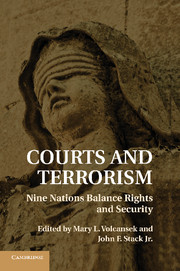Book contents
- Frontmatter
- Contents
- Contributors
- COURTS AND TERRORISM
- Introduction
- 1 Detentions and Security versus Liberty in Times of National Emergency
- 2 One More Casualty of the “War on Terror”
- 3 State Secrets and Democratic Values
- 4 What Lessons Can Be Drawn from a Sui Generis Case? The Global “War on Terror” and Northern Ireland
- 5 The British Experience with Terrorism: From the IRA to Al Qaeda
- 6 Detention and Treatment of Suspected Terrorists under the European Convention on Human Rights
- 7 Australia's Commonwealth Model and Terrorism
- 8 Judicial Rejection as Substantial Relief: The Israeli Supreme Court and the “War on Terror”
- 9 Preserving Rights and Protecting the Public: The Italian Experience
- 10 Squaring the Circle? Fighting Terror while Consolidating Democracy in Spain
- 11 From Exception to Normalcy: Law, the Judiciary, Civil Rights, and Terrorism in Colombia, 1984–2004
- Conclusion: Lessons Learned
- Cases Cited
- Statutes Cited
- References
- Index
Conclusion: Lessons Learned
Published online by Cambridge University Press: 05 July 2011
- Frontmatter
- Contents
- Contributors
- COURTS AND TERRORISM
- Introduction
- 1 Detentions and Security versus Liberty in Times of National Emergency
- 2 One More Casualty of the “War on Terror”
- 3 State Secrets and Democratic Values
- 4 What Lessons Can Be Drawn from a Sui Generis Case? The Global “War on Terror” and Northern Ireland
- 5 The British Experience with Terrorism: From the IRA to Al Qaeda
- 6 Detention and Treatment of Suspected Terrorists under the European Convention on Human Rights
- 7 Australia's Commonwealth Model and Terrorism
- 8 Judicial Rejection as Substantial Relief: The Israeli Supreme Court and the “War on Terror”
- 9 Preserving Rights and Protecting the Public: The Italian Experience
- 10 Squaring the Circle? Fighting Terror while Consolidating Democracy in Spain
- 11 From Exception to Normalcy: Law, the Judiciary, Civil Rights, and Terrorism in Colombia, 1984–2004
- Conclusion: Lessons Learned
- Cases Cited
- Statutes Cited
- References
- Index
Summary
As the horrors of September 11, 2001, fade in our collective memory, people continue to dutifully remove their shoes at security checkpoints in U.S. airports, Australian authorities attempt to explain the requirement for placing all liquids in a small plastic bag for flights to the United States, and authorities at the Rome airport quarantine travelers to North America and Israel in a bunker-like Terminal T that is difficult to find or reach. Yet, terrorists remain active across the world and are not limited to supposedly Islamic fanatics. Narco-traffickers terrorize Mexico, large bombs continue to be found in parts of Northern Ireland, hotels are bombed in Mumbai, and car bombings are regular occurrences in Pakistan. Moreover, a number of long-held beliefs about citizens' rights to privacy, government transparency, and treatment of the criminally accused in much of the world may have also become casualties of terrorism. The tenuous balance between preserving national security and democratic governance and human rights may possibly have been irrevocably altered, as the contributions to this book suggest.
Although all terrorists use similar methods, their goals and aims can be different. The Irish Republican Army, ETA, the Red Brigade, FARC, and ELN used violence to attain autonomy or to effect fundamental change in one nation (Löwenheim and Steele, 2010). The same has been true for most of the terrorist foes in Israel. Yet other terrorists have interests that transcend national boundaries.
- Type
- Chapter
- Information
- Courts and TerrorismNine Nations Balance Rights and Security, pp. 224 - 234Publisher: Cambridge University PressPrint publication year: 2010
- 1
- Cited by



